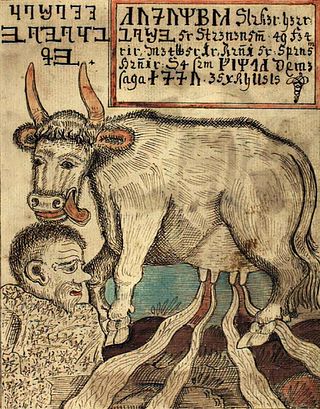Top Qs
Timeline
Chat
Perspective
Búri
Norse mythical character From Wikipedia, the free encyclopedia
Remove ads
In Norse mythology, Búri (Old Norse: [ˈbuːre]) is a divinity god 'producer, father' of all other gods,[1] and an early ancestor of the Æsir gods of the principal pantheon in Old Norse religion. Búri was licked free from salty rime stones by the primeval cow Auðumbla over the course of three days. Búri's background beyond this point is unattested, and he had a son, Borr, by way of an unknown process. Búri is attested in the Prose Edda, composed in the 13th century by Icelander Snorri Sturluson. The Prose Edda includes a quote from a 12th-century poem by skald Þórvaldr Blönduskáld that mentions the figure. Búri's mysterious origins are the subject of scholarly commentary and interpretation.

Remove ads
Name
The name Búri, like the name of his son Burr, is derived from the Proto-Germanic *buriz "son, born".[2] Thus, both names basically mean the same thing.[3] In research, Buri's name is translated as "begotten, father" and Burr as "begotten, son"[4][5] - probably because of the generational sequence. However, how he fathered his son is not explained; either by himself or through sexual reproduction.[6]
Remove ads
Attestations
Búri receives mention twice in the Prose Edda—once in Gylfaginning and again in a skaldic poem quoted in Skáldskaparmál. The Gylfaginning section reads as follows:
Translation:
She licked the ice-blocks, which were salty; and the first day that she licked the blocks, there came forth from the blocks in the evening a man's hair; the second day, a man's head; the third day the whole man was there. He is named Búri: he was fair of feature, great and mighty. He begat a son called Borr[.]
—Brodeur's translation
Búri is mentioned nowhere in the Poetic Edda and only once in the skaldic corpus. In Skáldskaparmál Snorri quotes the following verse by the 12th century skald Þórvaldr blönduskáld:
Nú hefk mart
í miði greipat
burar Bors,
Búra arfa.[8]
Translation:
Now have I snatched
much of the mead [made a lot of poetry]
of Buri's heir
Bor's son [Odin]
—Faulkes' translation
Remove ads
Notes and citations
References
External links
Wikiwand - on
Seamless Wikipedia browsing. On steroids.
Remove ads
